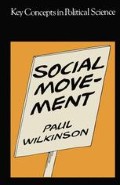Abstract
We shall make a convenient distinction throughout this study between ideologists, practitioners and scientists of social movement. Any individual whose major work and concern has been the formulation, elaboration and advocacy of normative or prescriptive theories or ideologies of society, may provide a source of ideological thinking and direction for a social movement, or for many social movements. In the case of a body of ideology that is particularly influential and widely disseminated, ideas derived from it will find their way into the general current of thought. Such major ideological sources will thus influence many participants unwittingly. Major ideologies may therefore be, to this extent, assimilated under historical movements, trends or tendencies. Nevertheless, in many cases, a minority social movement will consciously and consistently attempt to embody or realize the aims of an ideology quite unique to itself, and will expend much of its energies in ideological propaganda and public debate with its opponents.
Preview
Unable to display preview. Download preview PDF.
Notes and References
See J. C. Rees, “Lenin and Marxism”, in Lenin: the Man, the Theorist, the Leader, edited by L. Schapiro and P. Reddaway, Pall Mall Press, London 1967, pp. 87 - 105.
Shlomo Avineri, The Social and Political Thought of Karl Marx, Cambridge University Press, London 1968, p. 251.
Locke, Hume, Rousseau, Social Contract, World Classics Edition, Oxford University Press, London 1947, P. 245.
For example: Isaiah Berlin, Karl Marx, Oxford University Press, London 1960.
Shlomo Avineri, The Social and Political Thought of Karl Marx, Cambridge University Press, London 1968.
Sidney Hook, Marx and the Marxists: The Ambiguous Legacy, Princeton University Press, Princeton, New Jersey 1955.
Bertram D. Wolfe, Marxism: One Hundred Years in the Life of a Doctrine, Chapman and Hall, London 1967.
see R. L. Meek, “The Scottish Contribution to Marxist Sociology”, in Democracy and the Labour Movement (1954),edited by J. Saville.
K. Marx and F. Engels, Manifesto of the Communist Party, Foreign Languages Publishing House, Moscow 1957, p. 83.
Donald MacRae, “The Bolshevik Ideology”, in Ideology and Society: Papers in Sociology and Politics, Heinemann, London 1961, pp. 181–97.
Karl Marx, Preface to Capital, Vol. I, Foreign Languages Publishing House, Moscow 1965, p. 10.
see Marx, “The Wages of Labour”, in Economic and Philosophic Manuscripts of 1844, Progress Publishers edition, Moscow 1959, pp. 23–36.
Author information
Authors and Affiliations
Copyright information
© 1971 Macmillan Publishers Limited
About this chapter
Cite this chapter
Wilkinson, P. (1971). Rousseau, Marx and Movement. In: Social Movement. Key Concepts in Political Science. Palgrave, London. https://doi.org/10.1007/978-1-349-01093-6_2
Download citation
DOI: https://doi.org/10.1007/978-1-349-01093-6_2
Publisher Name: Palgrave, London
Print ISBN: 978-0-333-12105-4
Online ISBN: 978-1-349-01093-6
eBook Packages: Palgrave Political & Intern. Studies CollectionPolitical Science and International Studies (R0)

